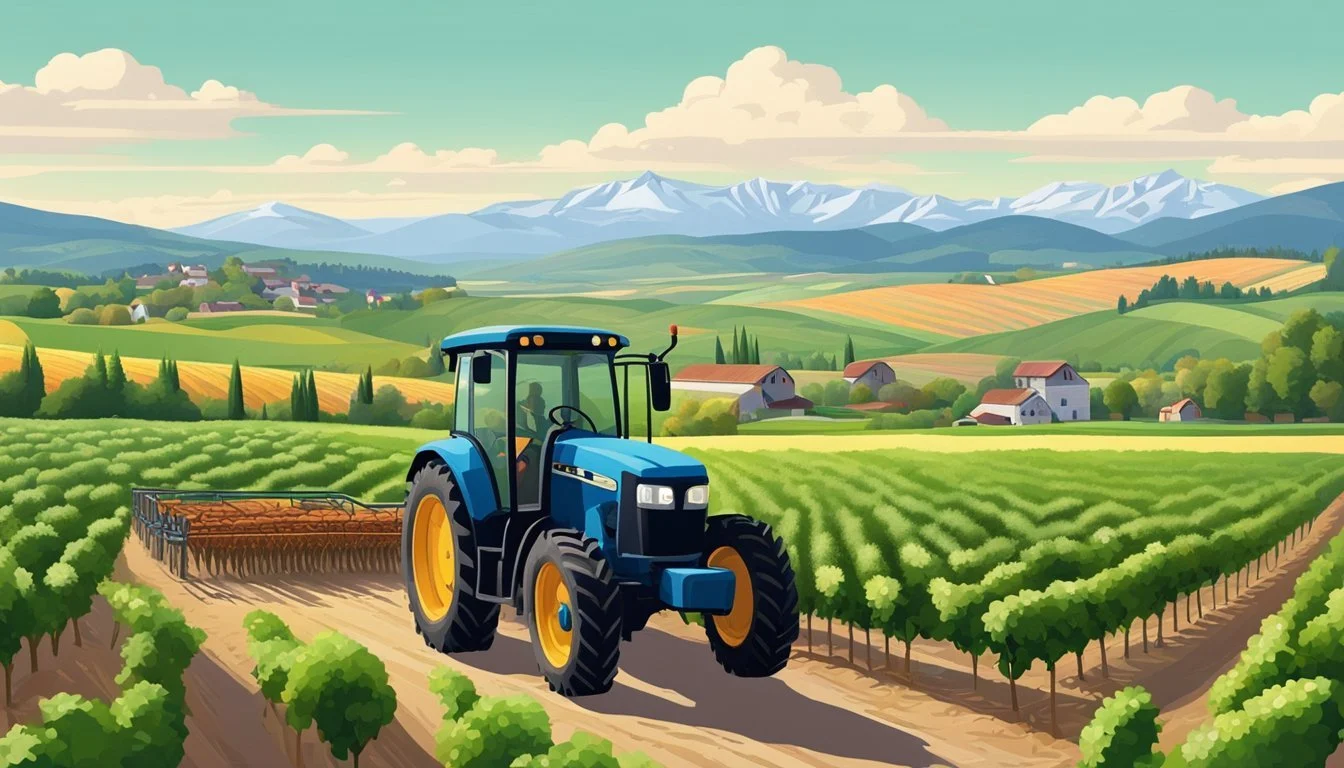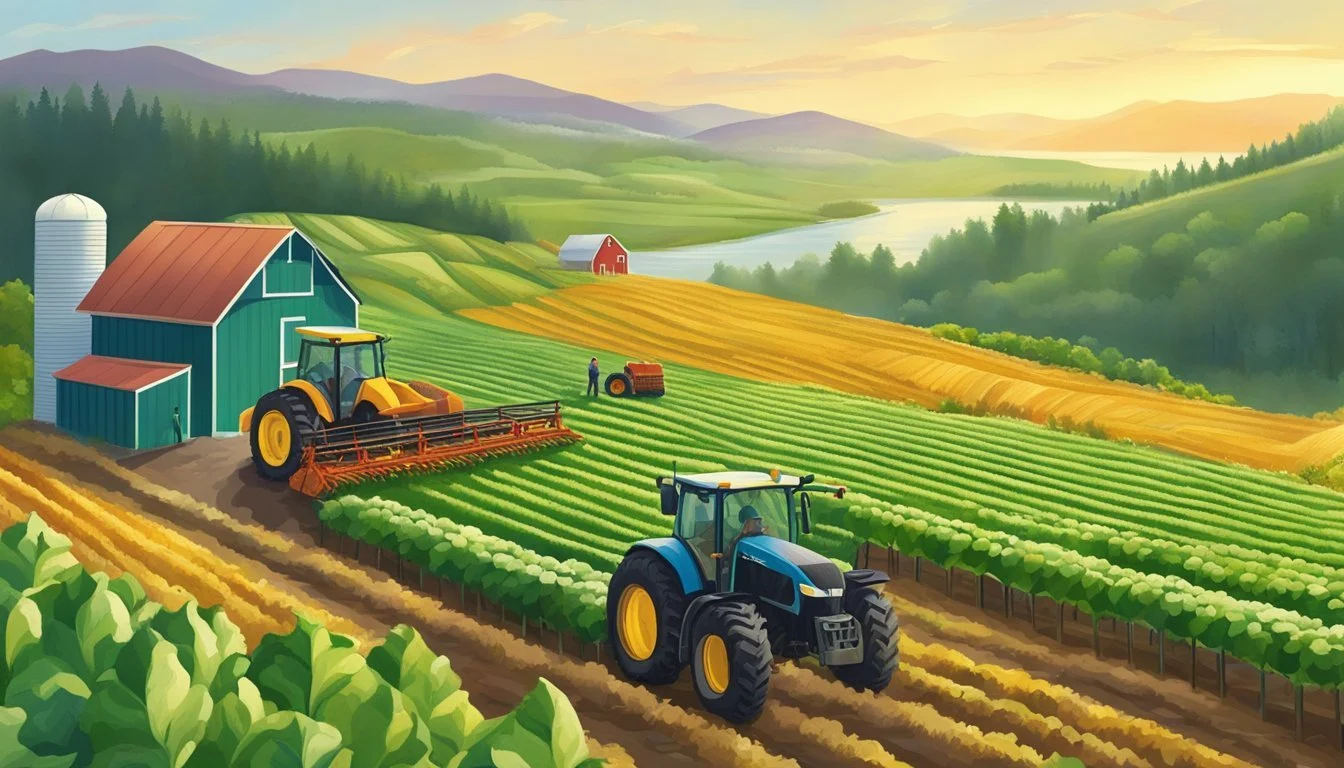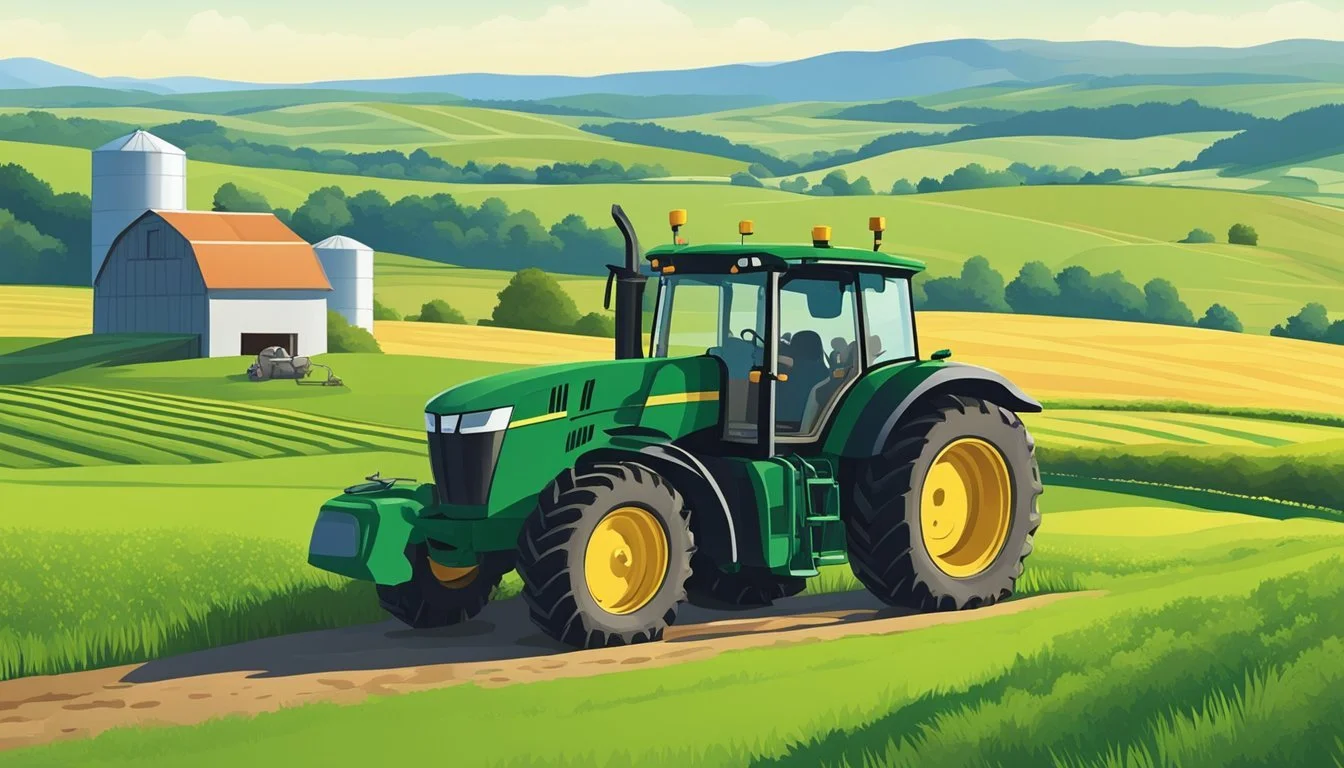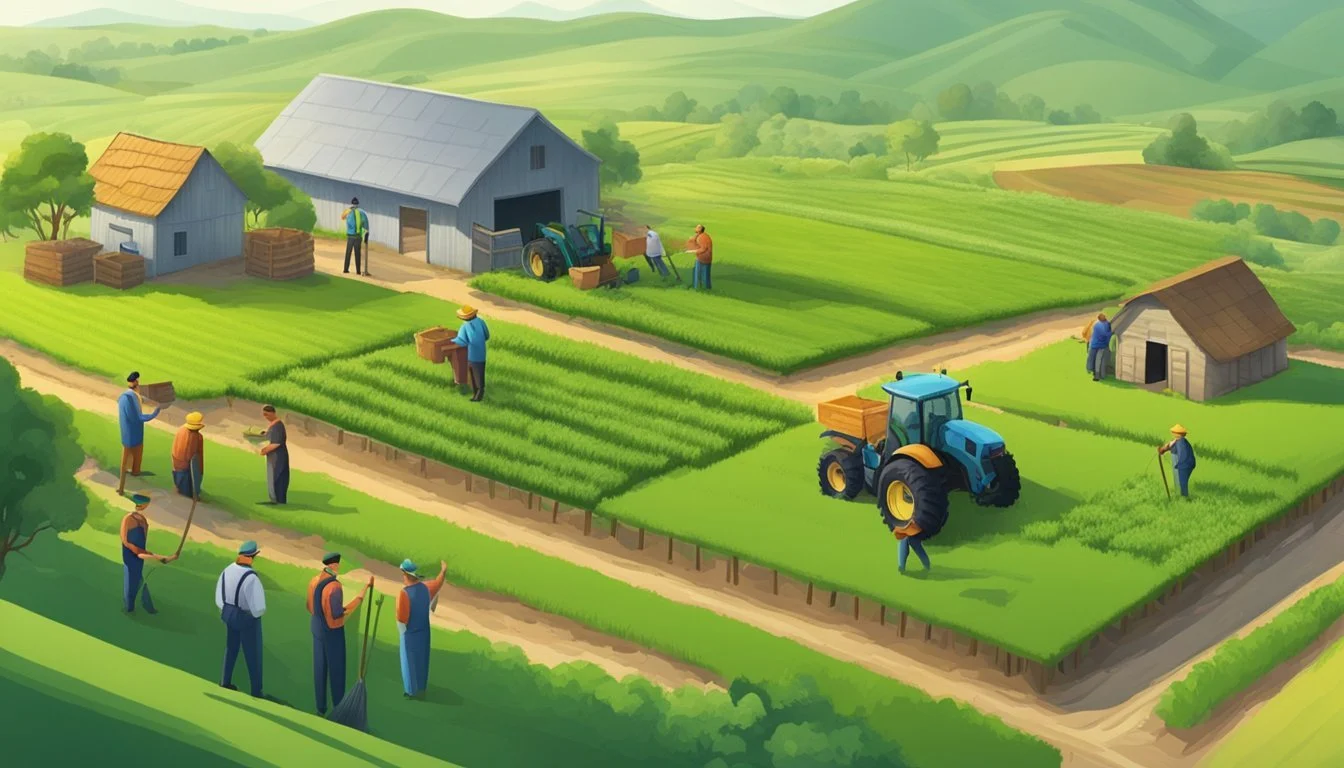Guide to Farming in Washington
Essential Tips for Successful Agriculture
This Article is Part of Our State by State Farming Guide
Washington State is a prominent figure in the United States' agricultural landscape, boasting a diverse and robust farming economy. Known particularly for its apple industry, which generates 70 percent of U.S. apple production, Washington's agricultural prowess extends well beyond this staple crop. The state's fertile land and favorable growing conditions have seen it become a leading producer in a wide array of agricultural goods. From tree fruits to berries, and dairy to nursery plants, agriculture is a vital part of Washington's economy, supporting thousands of jobs and contributing significantly to both the state and national markets.
Farming in Washington is not monolithic but multifaceted, with a variety of operations ranging from large commercial farms to small-scale local growers. The state supports its farmers with resources such as training programs, farm incubator programs, and on-farm work opportunities that help aspiring and experienced farmers alike. This commitment to agriculture is reflected in the many organizations dedicated to connecting consumers with local farms, promoting sustainable practices, and offering continuing education in farming techniques and business strategies.
New and established farmers in Washington State operate in a system that values both innovation and tradition. A wealth of resources is available to those looking to explore or expand their farming ventures, ensuring the state remains at the forefront of the American agricultural industry. With an array of crops that rank highly in production nationally, the state’s agriculture not only feeds its residents but also supplies a significant amount of food and plant products across the country and beyond.
Getting Started in Washington Farming
Embarking on a farming venture in Washington State requires a solid understanding of the local agricultural landscape, a well-structured business plan, careful choice of location, and secure funding to sustain the development.
Understanding Washington State Agriculture
Washington's diverse climate and geography accommodate a variety of crops and livestock. Farmers must acquaint themselves with the regional climate patterns, soil conditions, and county-specific agricultural regulations. Agriculture in Washington thrives on a mix of small and large-scale operations, with an emphasis on both traditional and direct-marketing farms.
Developing a Business Plan
A robust business plan is crucial for the success of a farm. It should detail the production methods, type of crops or livestock, marketing strategies, and financial projections. Resources such as the Washington State Department of Agriculture provide assistance in creating a business plan that aligns with local practices and markets.
Choosing Your Farm's Location
The location of a farm significantly impacts its productivity due to differing soil types, climate zones, and access to markets. Prospective farmers should engage with local entities like the Jefferson County Assessor's Office to assess the suitability of land for their agricultural goals.
Securing Funding
Securing adequate funding is paramount in launching and sustaining a farming operation. Farmers can explore various funding sources such as USDA grants, local financial programs, and private loans. It's important to leverage financial planning tools to ensure a farm's economic viability and to take advantage of tax-exempt status where applicable, as with organizations like the Tilth Alliance.
Farm Operations Management
Effective farm operations management encompasses a broad range of activities that are crucial for maintaining productivity and sustainability in agriculture. This section delves into the various aspects of managing a successful farm, highlighting some best practices that farmers can integrate into their business models.
Cultivating and Harvesting Crops
Farmers must select suitable crops for the region's climate and soil conditions. They commonly rely on the Washington State University's agricultural research to identify the crops that are most likely to flourish. Crop rotation and compost usage are key practices that enhance soil fertility and reduce pest and disease outbreaks. When harvesting, timing is crucial to ensure the highest quality and yield of the products.
Farm Maintenance and Equipment
Regular maintenance of farm equipment is essential to avoid breakdowns that can disrupt farm operations. A maintenance schedule for tractors, plows, and other machinery helps prevent costly repairs and downtime. In addition, proper storage facilities for the equipment ensure a longer lifespan and better functionality.
Weekly checks: Inspection of engines, hydraulics, and electrical systems.
Seasonal maintenance: More in-depth checks based on hours of operation.
Innovative Farming Practices
Innovative farming practices, such as precision agriculture and sustainable water management, are becoming increasingly important. Incorporating agriculture research, farmers can apply techniques like drip irrigation to conserve water or use GPS technology to optimize field operations, thereby reducing waste and improving crop yields.
Precision Agriculture: Uses technology to manage fields.
Sustainable Practices: Includes water conservation and soil health.
Managing Farm Finances
Managing farm finances effectively ensures the economic viability of the operation. Agricultural businesses need to account for costs, set budgets, and track expenditures.
Revenue Streams: Crop sales, agrotourism, and value-added products.
Expenditure Tracking: Inputs like seeds and equipment, labor, and overhead costs.
It's important for farmers to explore diverse markets and funding opportunities that can include local food networks, grants, and loans. Keeping accurate financial records aids in making informed decisions that can lead to farm growth and sustainability.
Washington's Key Crops and Commodities
Washington State stands out in the agricultural sector, leading in various crop productions that bolster the U.S. food supply and contribute to global markets.
Crops at the Heart of Washington's Agriculture
Washington's agriculture is powerful, underscored by apple production, where it commands 70 percent of U.S. production. The state also excels in other key commodities:
Hop Production: Washington is a leading producer nationally, supporting a robust brewing industry.
Potato Farming: Known for high yields, Washington’s potatoes are a staple crop with significant contributions to both domestic and international markets.
Wheat: With vast dryland farming areas, it's a significant producer of high-quality wheat, crucial for both food and feed.
Exploring Specialty Crops
Beyond these staples, Washington's diverse climate and soil nurture a variety of specialty crops that enrich its agricultural portfolio:
Asparagus: Among the top producers in the country, Washington's asparagus is sought after for its quality.
Sweet Onions: With a unique growing environment, Washington provides distinct sweet onions that are cherished by consumers.
Mint: The state’s mint production is vital, supplying a substantial portion to national demand for its aromatic oils.
Dry Peas: A leader in the production of dry peas, contributing significantly to both national consumption and exports.
Livestock and Dairy Production
While crop production is a highlight, Washington's agriculture also encompasses livestock and dairy:
Dairy: It is a key player in milk production, with per cow production rates indicating efficient and high-quality dairy farming.
Cattle: Beef production forms a part of the state's commodity portfolio, with cattle ranches spread across various counties.
In summary, Washington's agricultural dominance is multidimensional, featuring a wide array of crops and commodities that are integral to the state's economy and the nation's food system.
Marketing and Selling Agricultural Products
Proper marketing and selling practices are pivotal for Washington State's agricultural community to thrive. They enable farmers to connect with consumers and ensure a sustainable livelihood by effectively promoting and selling their products.
Building Your Brand
A farm's brand encapsulates its values, quality, and the uniqueness of its products. Farmers should focus on creating a strong brand identity that resonates with consumers, often through storytelling and visually appealing packaging. This identity makes their products instantly recognizable and can build a loyal customer base.
Direct Marketing Strategies
Direct marketing allows farmers to sell their products directly to consumers without intermediaries. Strategies include:
Farmers Markets: Interact and sell directly to consumers, offering fresh and locally-grown products.
Community Supported Agriculture (CSA): Consumers become members and receive a portion of the farm's harvest, providing upfront capital for farmers.
U-pick Operations: Customers visit the farm to pick their own produce, enhancing their connection to the farm.
Direct sales not only boost profits but also strengthen the relationship between farmers and their customers.
Wholesale and Retail Selling
Selling agricultural products through wholesale channels, like supermarkets or restaurants, requires understanding of larger volume needs and pricing structures. The retail approach often involves more personal selling experiences, either through farm stands or online platforms. In both cases, compliance with state regulations governing sales and food safety is crucial.
Market Challenges and Opportunities
This section explores the dynamic landscape of farming in Washington, examining the environmental, market, and security factors that influence the industry's health and growth.
Facing Climatic and Environmental Challenges
Farmers in Washington are accustomed to the state's varied climate, especially in the moisture-rich Columbia Basin. However, climate change introduces increased unpredictability, with the potential for both droughts and floods posing significant risks to stability and output. Adapting to these conditions is critical for the continued success of the agricultural sector.
Adapting to Market Trends
Consumer preferences are shifting, with an uptick in demand for locally-grown and organic produce. Washington's farmers must adapt to these trends to remain competitive. Embracing innovative marketing strategies and sustainable farming practices can help producers connect with consumers and capitalize on new market opportunities.
Ensuring Food Security
Food security remains a priority as Washington's agricultural industry plays a vital role in feeding the state’s population and beyond. The challenge lies in balancing productivity with sustainable practices and making nutritious food accessible to all consumers, especially those in underserved communities. Addressing these challenges is pivotal for the industry's ability to ensure a stable food supply.
Support and Resources for Farmers
Washington State offers a robust network of support and resources designed to assist farmers in various aspects of agricultural production and business. These include agricultural organizations offering programs and advocacy, crop insurance and risk management strategies, as well as research and education tailored to the region's unique farming needs.
Agricultural Organizations and Programs
Farmers in Washington can tap into the services of the Washington State Department of Agriculture's Regional Markets Program, which aims to enhance the economic viability of small and direct-marketing farms. This program is crucial for increasing the availability of healthy, locally-grown foods and supporting local food economies. Additionally, the Tilth Alliance bolsters farmers through education, funding, and resources that promote organic and sustainable farming practices. For farmers seeking land, the Washington Farmland Trust offers the Farm to Farmer program which facilitates access to farmland through sales or leases, ensuring land remains dedicated to agriculture.
Crop Insurance and Risk Management
Understanding the importance of safeguarding their livelihoods, Washington farmers have access to a variety of crop insurance options and risk management tools. The USDA provides federal crop insurance programs, protecting against the loss of crops due to natural disasters or the decline of market prices. These programs are essential for stabilizing farm income and enabling farmers to manage production risks effectively.
Research and Education
Research and education are pillars of agricultural success, and Washington's farmers are well-supported in this regard. Washington State University's Regional Small Farms program is a key resource offering information on land access and agricultural practices. Through a multitude of classes, workshops, and field days, as well as resources like PDF guides, farmers can stay informed about the latest advancements in farming techniques and sustainability practices, which are instrumental in driving the industry forward.
Community and Expansion
In Washington, farming's future hinges on robust community ties and strategic growth. Farms leverage local support and innovative market strategies to secure their place in the region's agricultural landscape.
Engaging with the Rural Community
Farming communities in Washington thrive on collaboration. Farmers engage with local government, Tribal representatives, and community stakeholders to create farmland protection strategies. Programs like Farm to Farmer rely on such partnerships to ensure farmland remains available and sustainable for future farming endeavors.
Adding Value to Your Farm
To remain competitive, Washington farmers are advised to add value to their produce. This can involve starting agritourism activities or developing value-added products. Such diversification not only boosts farm income but also strengthens the economic fabric of rural communities.
Exploring New Markets to Expand
Expanding into new markets is crucial for farm growth in Washington. This requires a clear marketing strategy that might include:
Attending food safety trainings to reach higher-value markets.
Analyzing production data to better align with consumer demand.
Pursuing certifications that open doors to niche markets.
Farmers can capitalize on the state's diverse agriculture by targeting both national and international markets, ensuring their produce meets the needs of a broad customer base.
Sustainable Farming Initiatives
Washington's agriculture community embraces innovative programs to further environmental sustainability. These initiatives range from enhancing carbon sequestration to advancing organic farming methods, all with a focus on sustainability and climate-smart agricultural practices.
Implementing Sustainable Practices
Washington State is a leading proponent of climate-smart agriculture. Farmers and ranchers engage in practices that increase carbon sequestration and reduce greenhouse gas emissions through the Sustainable Farms and Fields (SFF) grant program. This initiative underscores the state's commitment to reducing the environmental footprint of its agricultural sector.
Carbon Sequestration: Implementation of strategies to capture atmospheric carbon dioxide.
Greenhouse Gas Reduction: Adoption of advanced techniques to minimize emissions.
Utilizing Organic and Biodynamic Farming
Organic and biodynamic farming are pivotal to Washington’s agricultural strategy. They emphasize environmental sustainability, enhancing soil vitality, and supporting pollinators:
Organic Certification Support: Financial assistance provided by entities like the Tilth Alliance.
Biodynamic Practices: A holistic approach that treats farms as self-sustaining ecosystems.
Farmers benefit from the Washington State Organic & Sustainable Farming Fund, which offers grants to finance projects that bolster their farm businesses' ecological and economic aspects.
Creating a Compost Systems
Composting is a core element in sustainable agriculture as it recycles organic waste into nutrient-rich soil amendments, fostering soil health and reducing dependency on chemical fertilizers. Washington embraces this practice, promoting compost use through various programs:
Compost Infrastructure: Development of facilities and systems to handle organic waste.
Education and Advocacy: Resources for farmers to learn about compost benefits and techniques.
Farmers are encouraged to create and maintain compost systems to improve soil quality and contribute to the state's broader environmental goals.
Conclusion
This section wraps up the critical insights on farming in Washington and looks ahead to the prospects of the agricultural sector in the state.
Summary of Farming in Washington
Washington State's agriculture is a dynamic blend of rich resources, including a diverse climate, fertile soil, abundant water, and an industrious workforce. These elements have firmly established the state as an agricultural leader. Notably, with 70 percent of U.S. apple production rooted in Washington, it stands at the forefront of the country's industry. Rural communities are integral to this success, providing a network of small and large farms that drive both local and national markets. The diversity in crop production is a testament to the state’s capacity to adapt and thrive within various agricultural niches.
The Future of Farming in the State
Moving forward, the agricultural future in Washington is seen through the lens of innovation and sustainability. The state endeavors to support farming operations that foster growth while safeguarding resources. Rural communities remain at the heart of this progress, with emphasis on bolstering small farms and their contribution to the state economy and food systems. Ongoing research and technological advancements ensure that Washington's agriculture not only sustains its current production levels but also adapts to future challenges and demands.










